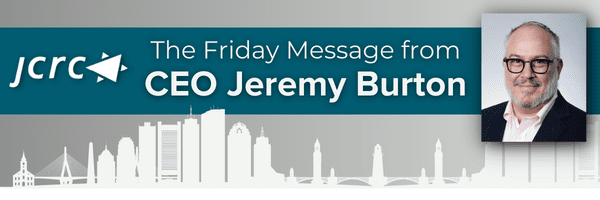“To be literally informed about America’s Jewish problem, it is not necessary to know Hebrew or Yiddish. All that is required, initially, is a familiarity with the English alphabet. The following primer of English letters with Jewish meaning will serve for illustration.”
I read those words last Thursday and I held my breath.
I was visiting the Wyner Family Jewish Heritage Center, where JCRC’s archives, and so much of the New England Jewish community’s history is preserved. The staff had invited me to check out the collection following JCRC’s recent program with Professor Charles Gallagher. I sat down with him in April to talk about his book, Nazis of Copley Square. If you joined us that day you may recall that he talked about his use of JCRC’s archive, where so much information about right-wing extremism in 1930’s Boston is kept for posterity.
As I looked through JCRC’s archives, another file, from June 1958, caught my eye. In a collection about our efforts to track and confront “White Citizens” councils and other groups here in Boston, there is a professionally printed pamphlet, The Point, produced in Still River, MA. This 4-page issue is devoted, in its entirety, to a mapping of the Jewish communal institutions of the time. Those words above come from the introduction. The rest of the newsletter is in the same hateful vein.

(R): From the JCRC archives: The Point, 1958
I’ve been thinking a lot about that document, and our purpose, this past week.
It was a rough week. I don’t need to tell you. We all follow the news. Last Saturday some 100 white nationalists marched through the streets of Boston. The condemnations and the questions followed. I’m reminded again how grateful we are to our partners at the ADL for their efforts and their their efforts.
Then, of course, came the horror in Highland Park, Illinois on July 4th. This is one of those weeks when I’m grateful that it is not just Jews, but also leaders like Rev. Cornell Brooks at Harvard, who are connecting the dots for us, naming that antisemitism is a likely factor here, even as the investigation continues.
It was also the week when antisemitic flyers were distributed in several towns around Massachusetts, including Chatham, Ipswich, and Hamilton.
We at JCRC have been paying attention to the threat of right-wing extremism for a very long time. In the 1930’s, Jewish leaders and activists in Boston began monitoring Nazis in our city. This initiative led to the formation of JCRC as a shared communal effort to engage with government, the media, and faith partners. And, as the technology and the expressions of antisemitism have evolved and developed over the years, we’ve continued to focus on this work. But since the beginning, that focus has also included action – organizing our community and our partners to confront this hate; to articulate expectations for our elected officials, local media, and civic partners, and to build bonds of partnership around shared interests and shared threats to our civic fabric.
Although we know that antisemitism has evolved and is not limited to that which comes from the right (as even the reference, right now, to “mapping” reminds us) it still is not lost on us and our community that a particular and violent threat to Jews and to all Americans, and to the very fabric of our democracy, is very real, as was seen again this week:
One of the efforts we’ve amplified and supported in recent years was the successful litigation by Integrity First for America against the neo-Nazis in Charlottesville. Robbie Kaplan and Yotam Barkai, two of the attorneys in that effort, said it well in the Boston Globe this week:
In light of Patriot Front’s actions — in Charlottesville in 2017, in Idaho in June, and in Boston this past weekend — anyone who doesn’t think that the freedom and independence that we celebrate every year is under severe threat is sorely mistaken. We hope that Americans are finally paying attention.
I hope that we, together, will continue to pay attention, to take this threat as seriously as we must, and that you’ll be a part of that work with us – confronting antisemitism, defending our democracy, and building bridges with all of Boston’s communities in service to our common future.
Shabbat shalom,
Jeremy
P.S. There were many incredible finds at the Wyner Family Center that tell our story and provide other examples of the ways we’ve been grappling with very familiar challenges as a community for a long time. I hope to tell you more in coming posts. And I encourage you to check them out as well. They are an amazing resource for our community.
 JCRC Statement on Polarization, 1970
JCRC Statement on Polarization, 1970


